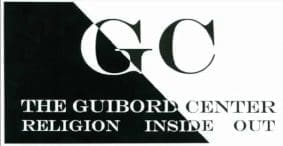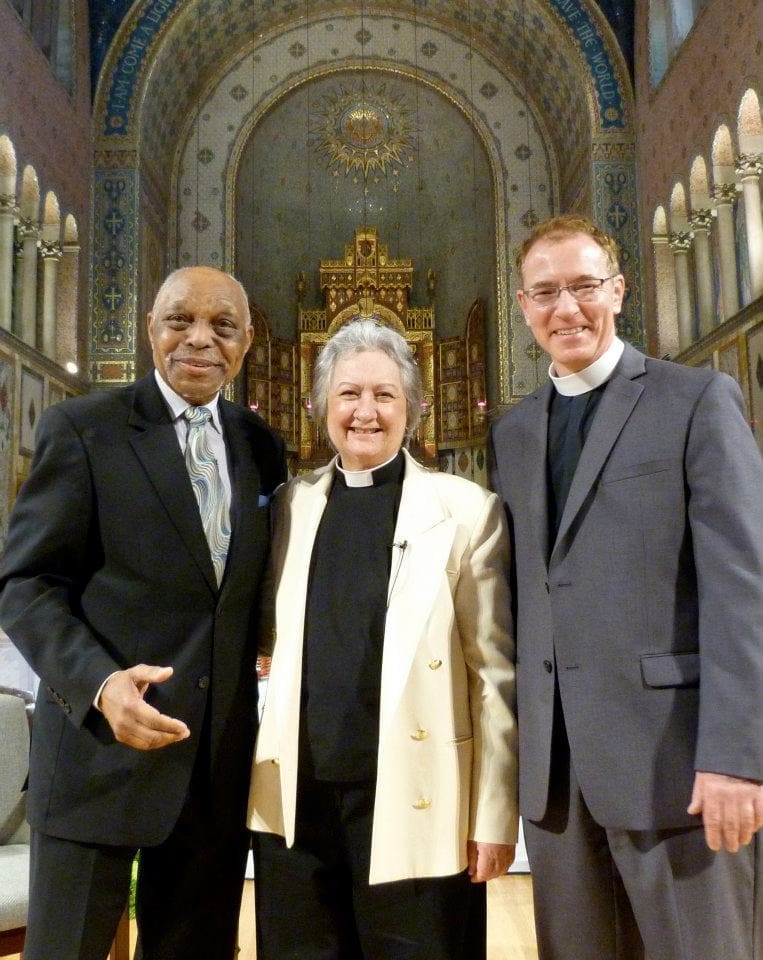
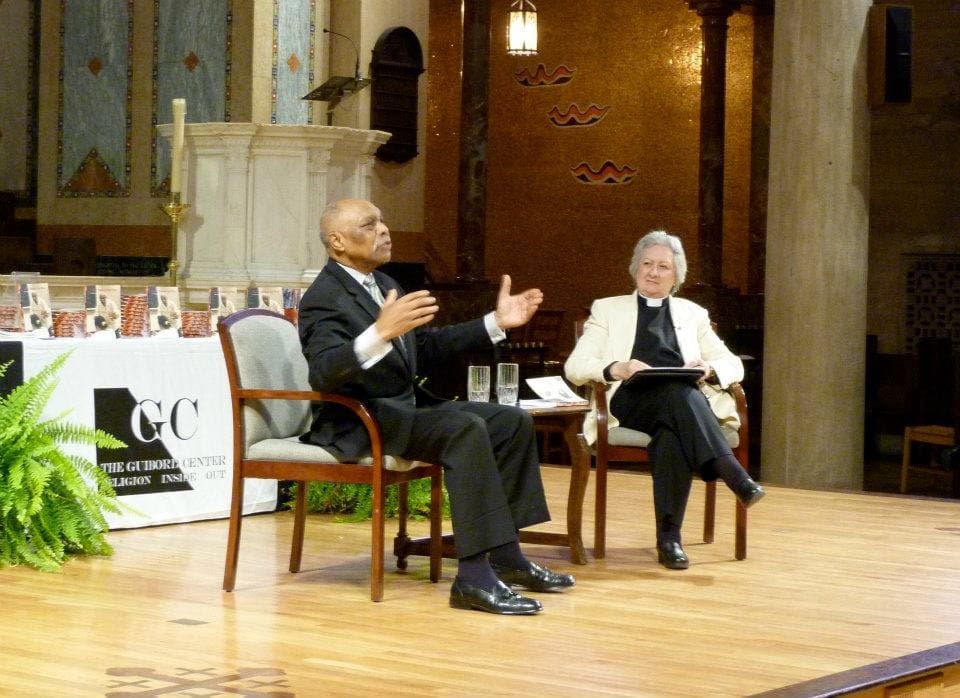
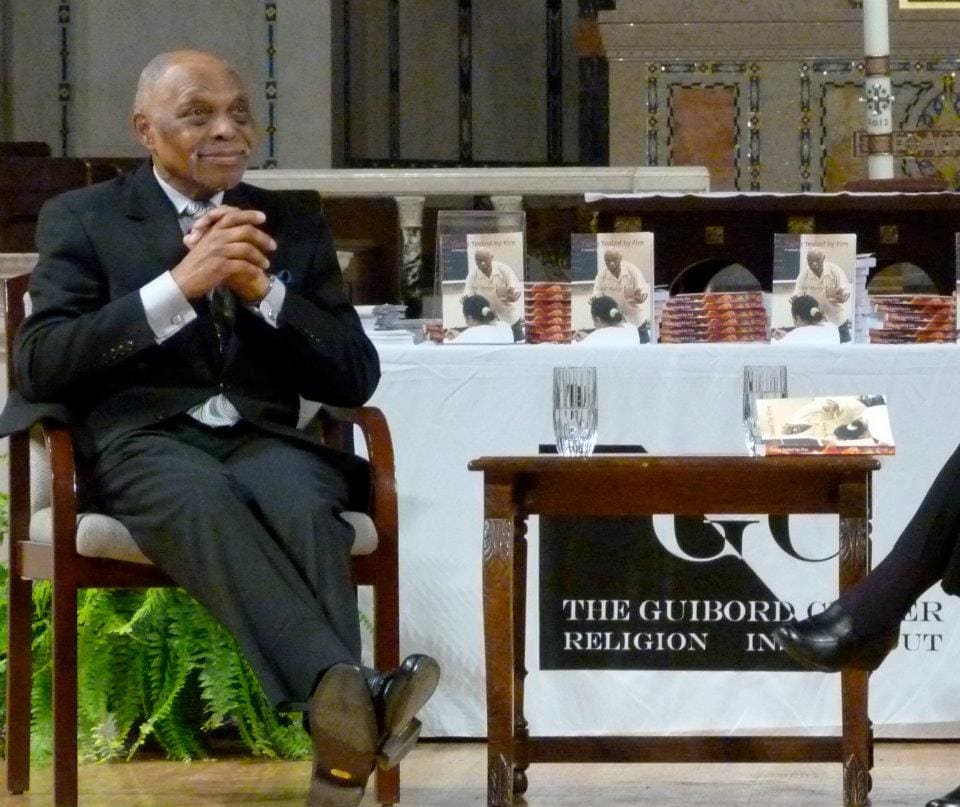
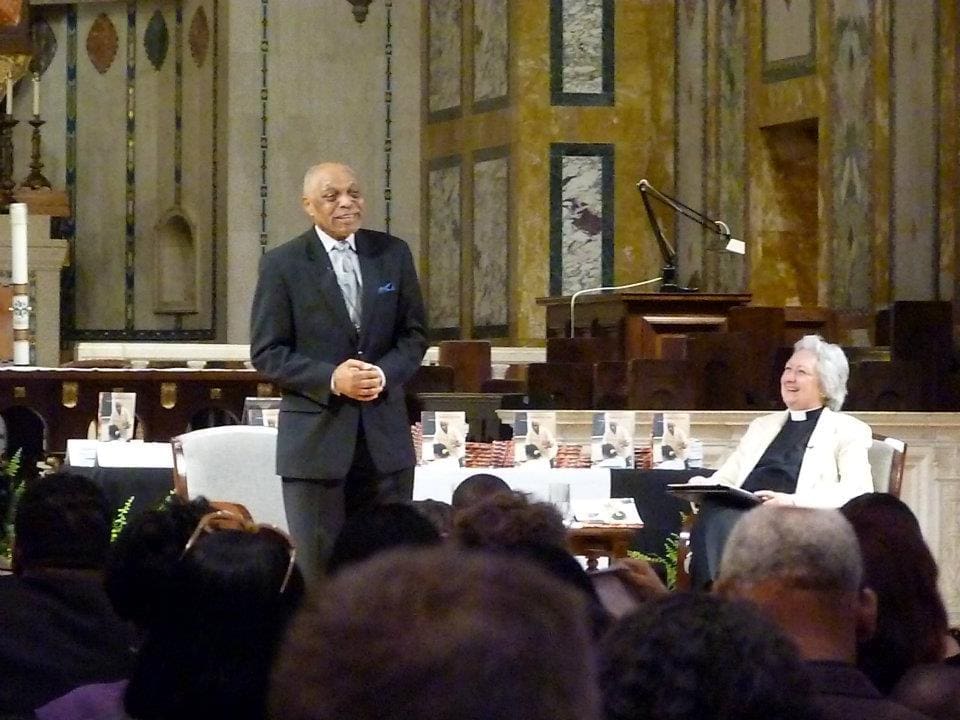
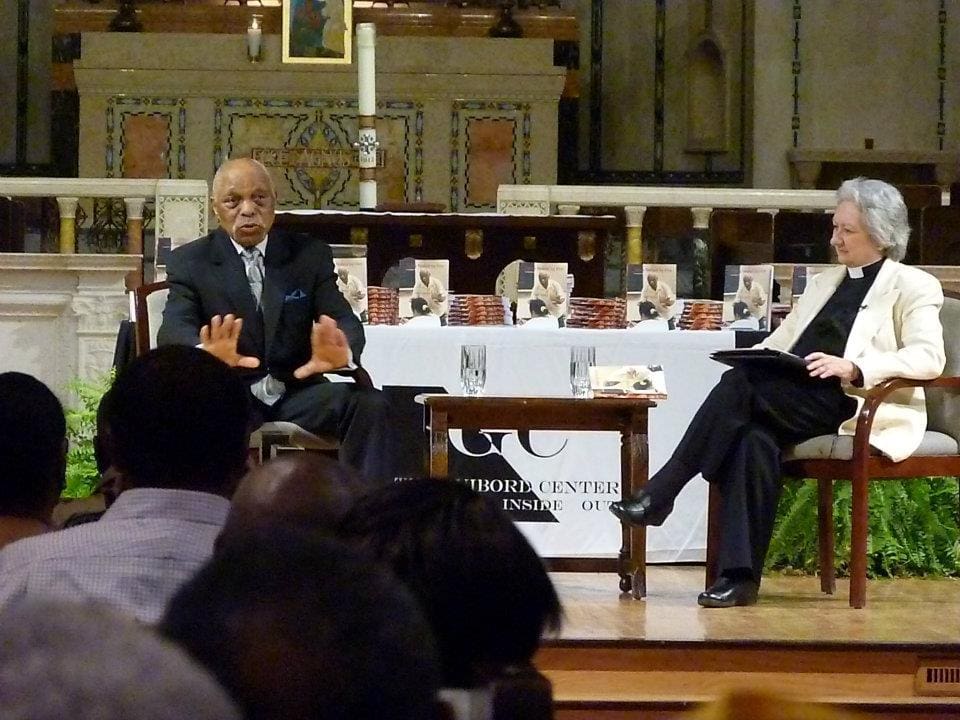
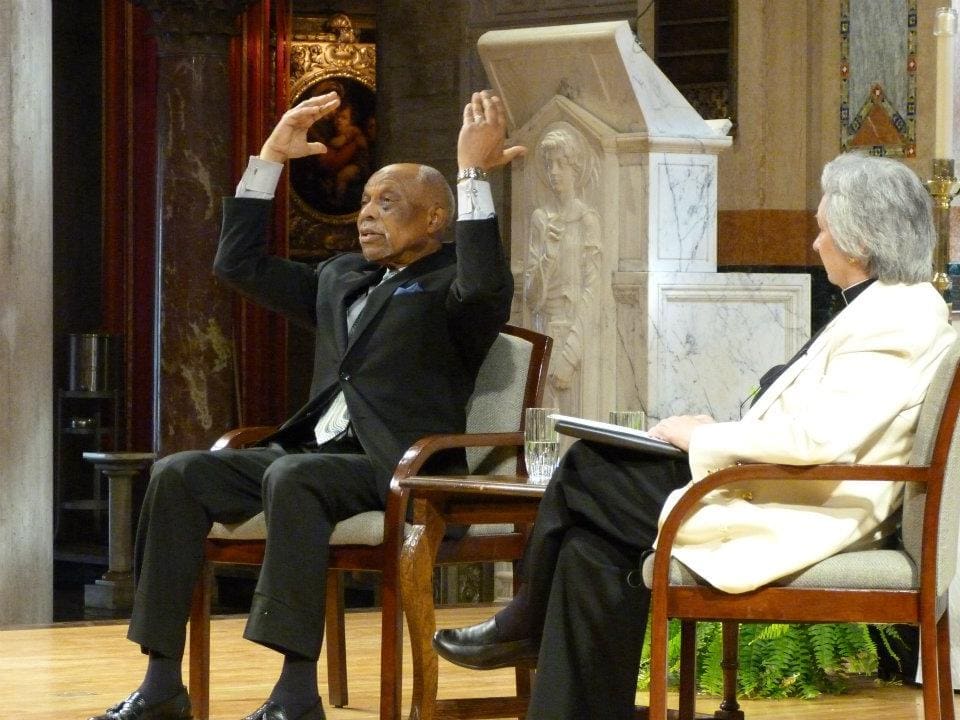
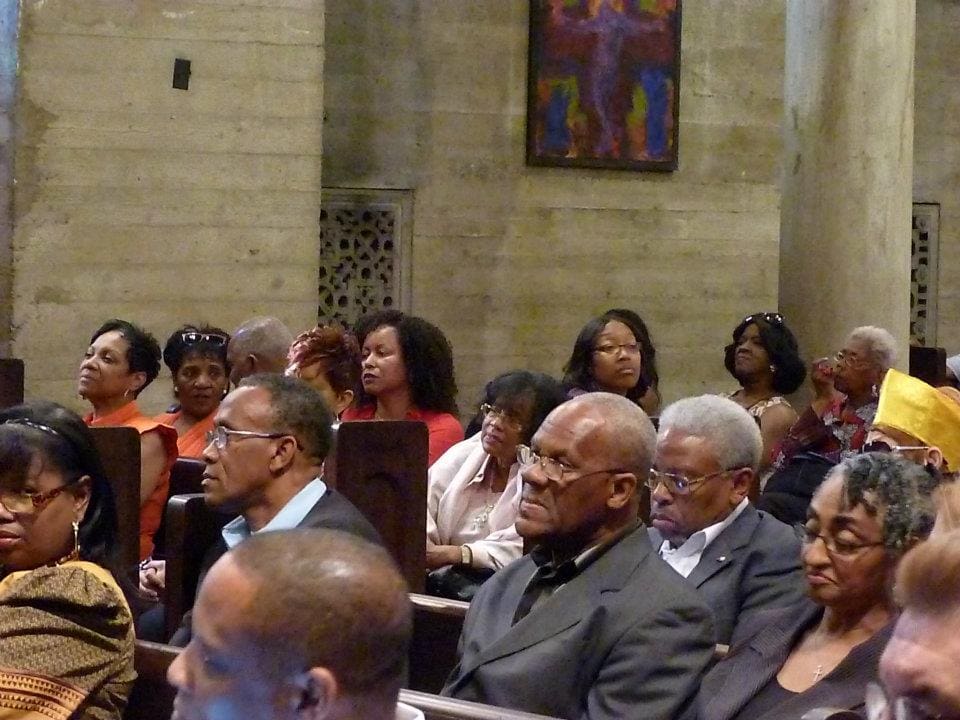
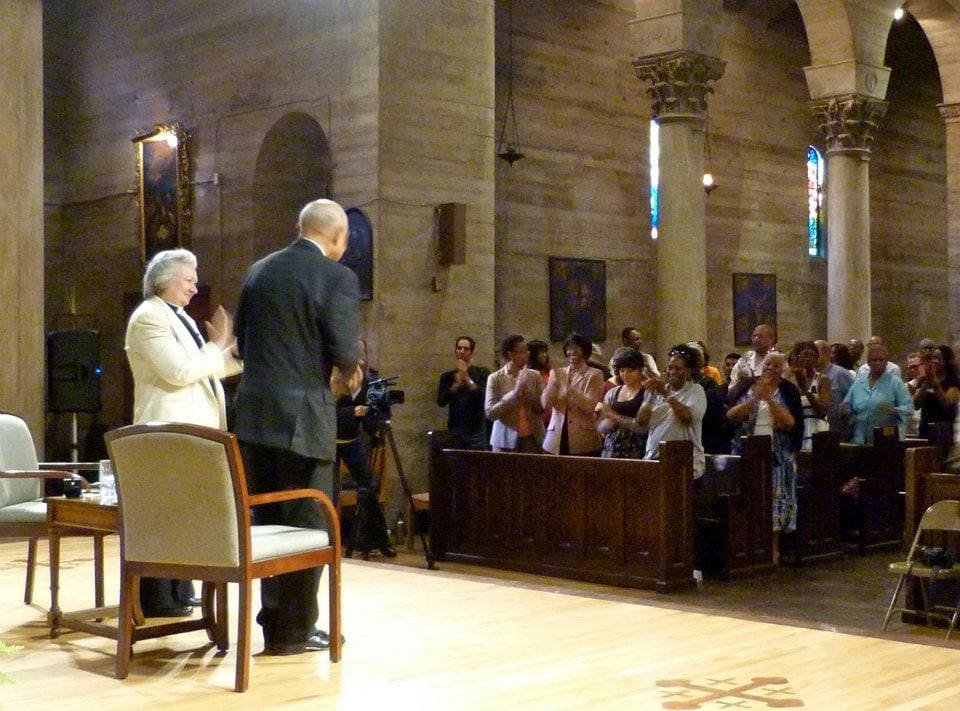
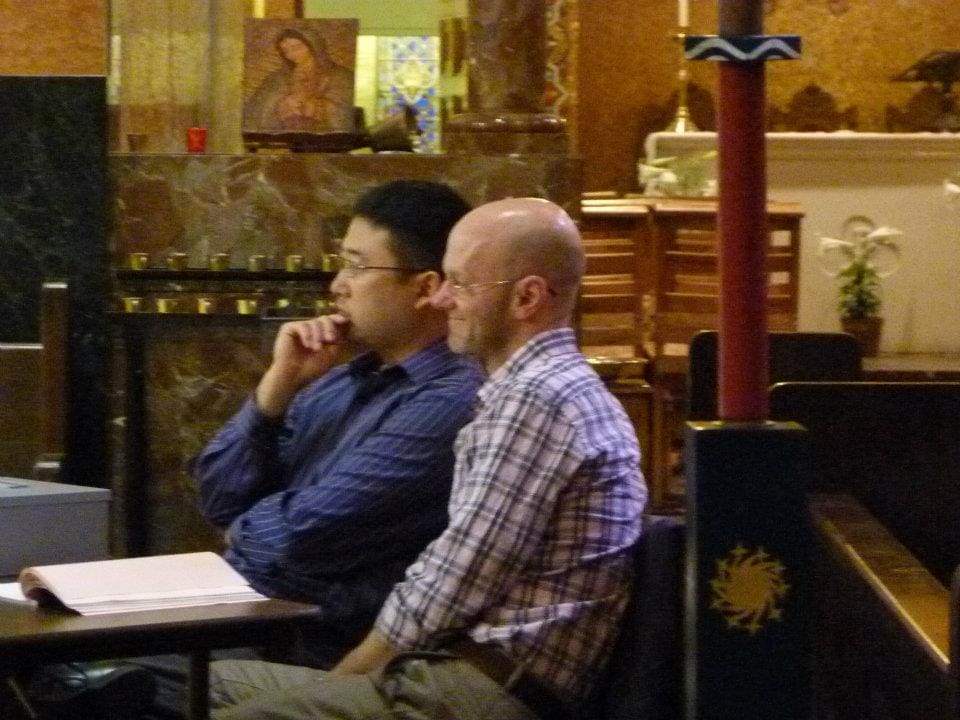
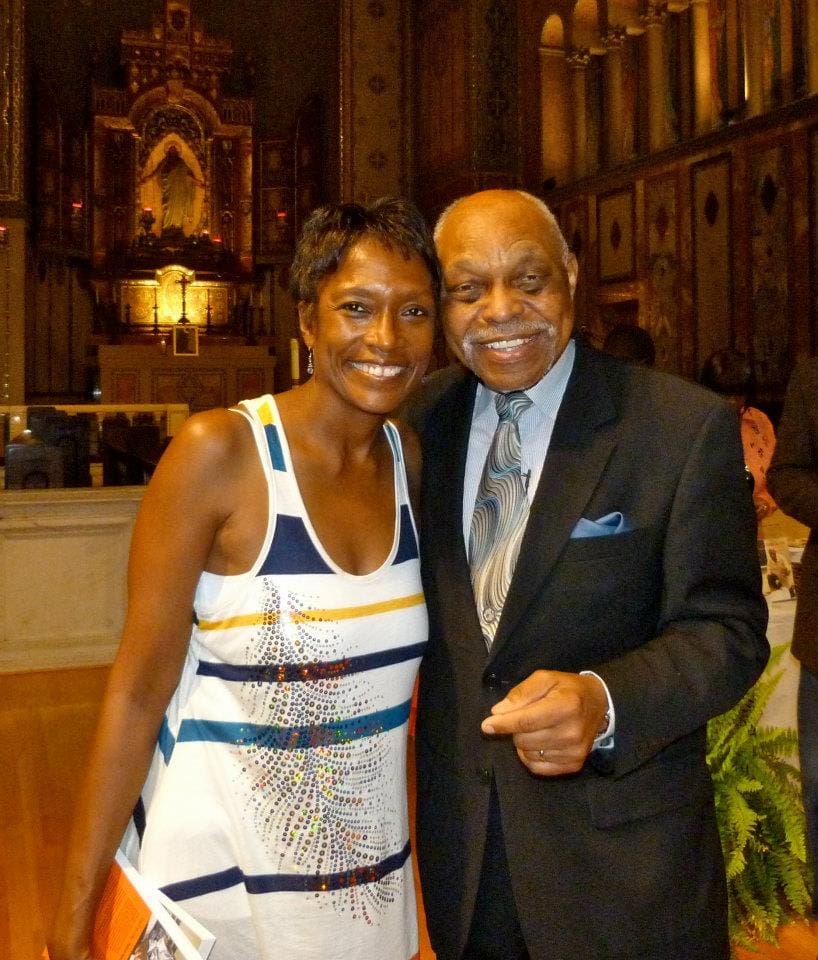
Twice Tested by Fire: A Conversation with the Rev. Dr. Cecil “Chip” Murray
The Rev. Dr. Cecil “Chip” Murray and the Rev. Dr. Gwynne Guibord have long been good friends and colleagues. Thus, it was fitting for The Guibord Center – Religion Inside Out and the Cecil Murray Center for Community Engagement to co-present this book launch. The event marked both the Murray Center’s opening and the 20th anniversary of the 1992 civil unrest that ignited Los Angeles, leaving it in flames and forever changed.
After Father Mark Kowalewski warmly welcomed everyone to St. John’s Cathedral, the Rev. Najuma Smith introduced the Murray Center. She noted the center is designed to be a “rising tide” that helps lift underserved communities from poverty, disease, and other challenges. Rev. Smith also thanked the generous individuals and organizations connected to USC and First AME Church (FAME) that made possible the event and the center itself.
Rev. Guibord then began the conversation in earnest. With her deeply respectful, spiritual directness she asked Rev. Murray to tell the story of his first encounter with the fire that nearly took his life and killed a friend – a man whom he has called his “brother” – who was fatally injured trying to get back to save him. Rev. Murray told of the Fire that transformed his life, the Fire that is still burning. “You cannot be a Moses and say yes to that burning without being willing to give your life to it and for it.”
He recounted being trapped in a burning plane, of having no way out, of there being one tiny space he could never get through and of the Voice that guided him calmly, clearly, step by careful step to safety. “Some will say it was the voice of my training,” he said. “But I know what I know that I know. It was the Voice of God.
“I am here before you this day to witness that the Lord would make a way somehow.” He vowed to live for two after the crash and prayed that his life might be useful.
The Voice stayed with him, calling him out of the Air Force and to seminary. He told of being hesitant because of the pastors who put themselves before the needs of their congregations. “But,” he continued, “that call taught me you cannot make a change from the outside. If you are going to make a difference you ought to get inside… My choice was to make a choice.”
Rev. Guibord then asked about other times when The Voice, The Constant Companion, spoke to him especially around Martin Luther King Jr.‘s Triple Evils: Poverty, Racism and War.
Rev. Murray spoke about Martin Luther King always being dedicated to the struggle for justice but the turning point in King’s life being when he stood before the “burning bush” of Mahatma Gandhi, a spiritual man who felt the pain of one billion people from India, most of them impoverished, while the British grew wealthy on their labor. Gandhi looked at the overlap between poverty, racism and war and decided he was going to make a change.
Pastor Murray addressed his 4 P’s of poverty: Poverty of pocket, family, education and imaging. “If we can help the next generation of Black youth to overcome that poverty (Poverty of Pocket), the other forms of poverty will take care of themselves.” He gave a sober history lesson often highlighted by King about in the loss of ownership in the Black community with integration the implication that “We, White folks have the power. You Black Folks are subservient.” being handed down throughout the country instead of the long sought-after desegregation: “Liberty and justice for all.”
“Our challenge in the twenty-first century, “ he continued, “ is how to own the [fishing] pond!”
Dr. Guibord brought the practical reality of the streets to the vision articulated by Pastor Murray in asking him to talk about the programs that flourished at FAME during the years of his leadership there when their credo was: “Find a way to say Yes.”
The accomplishments were both remarkable and inspiring as Pastor Murray ticked them off one after another.
- Prison Ministry.
- Free Legal Counseling with pro bono services provided by UCLA, USC, Jewish Temple Isaiah, the Jewish Attorney’s federation and others.
- 12 Step Programs in conjunction with The Church of Scientology.
- The Men’s Movement. The Men’s Patrol. The Men’s Organization which would mentor individuals in the Prison and Twelve-Step Groups.
- Thirteen different Housing Projects. Thirteen different sites housing over 2,000 tenants.
- Housing for the physically handicapped.
- Housing for seniors.
- Housing for HIV/AIDS people.
- And general public housing.
- FAME Renaissance – economic development – which provided loans for businesses from the ground up raising $400 million for business incubation, business loans, and business mentoring
- Medical Programs to Africa on an annual basis
- Youth Programs
- HIV/AIDS Programs
Rev. Dr. Guibord next asked Pastor Murray to talk about FAME’s role in keeping the peace and protecting people and property on all sides of the violence during and after the riots as well as its leadership position in healing the city afterwards.
Pastor Murray was electrifying as he told of this second round of fire that shaped his life and that of the people of Los Angeles. He spoke of desperate strategies to prevent even greater bloodshed and of the many courageous acts of individual and corporate generosity that brought healing to the still smoldering ashes. He chronicled the gradual strategic, layered transformation of the hostility and racism of the police into something quite different today.
He spoke about the evolution of racism in the very fabric of America seen in its first presidents’ participation in slavery and the denigration of the capacity of Black soldiers to be equal to White ones. He traced it through prisons and war to the Occupy Movement and The Sentencing Project and the many other ways that racism and poverty and war are being openly confronted throughout the country today.
With a final question from Dr. Guibord about the state of the Black Churches today, Pastor Murray began a passionate acknowledgement of the vibrant and crucial role of the Black Church. “The Black Church is the center of the Black Community historically, even when we were meeting down by the river-side. The Black Church took leadership in activism. We are there at the point of the spear except for the new generation of pastors [some of whom] care a little too much about themselves instead of about others…”
“The [Black] Church must redefine itself… The Church is where we must be able to turn because it is where we gather. It is the place where we care. It’s the place that carries the legacy of Martin Luther King, Jessie Jackson, Al Sharpton , myself – all of us come out of that Church. The NAACP looks to the Church. CORE, SNCC, those who are failing, they all look to the Church.
“Unless we can look beyond ourselves, unless we can see that the Founder of the Christian Church had one pair of shoes, one robe,.. we are lost.”
…”The Founder of the Church took up the Cross and asked us to follow, asked us to be as He, to be willing to suffer that others might not have to suffer.”
Pastor Murray then praised God for those churches of conscience and conscientiousness, for non-Black churches and White churches, the Church of Scientology, Jewish communities and Islamic communities and the Mormon Church, all people of faith who reach out to under-served communities.
In closing, Dr. Guibord said, “I would like to say this to you, Pastor Murray. It is written in the Book of Psalms that God is the giver of all gifts… You have been our gift!”
The audience stood on their feet and cheered. Pastor Murray made sure that God had the last word as he raised his hands to praise and thank the Lord and ask God’s protection over all who were gathered there.
